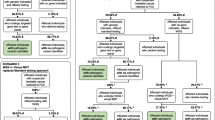Abstract
Next generation sequencing (NGS) gene panels are increasingly used in medical genetics clinics for the evaluation of common inherited cancer syndromes, but the clinical efficacy of these tests, and the factors driving clinical providers to order them are unclear. We conducted a patterns-of-care study to compare patients evaluated with NGS gene panels with a reference group. We abstracted demographic, socioeconomic, and clinical information in a retrospective cohort of patients referred to a large medical genetics clinic for evaluation of inherited colorectal cancer and polyposis syndromes. Patients tested with NGS gene panels were more likely to be insured compared to the reference group (85.3 % vs. 69.2 %, p = 0.0068),less likely to have prior tumor tissue testing (29.4 % vs. 54.3 %, p = 0.0004), and less likely to have an abnormal tumor tissue test result (46.7 % vs. 74.5 %, p = 0.01). No significant differences were found between groups in age, gender, race, employment status, personal history of colorectal cancer, or proportion of patients fulfilling Lynch syndrome clinical criteria. Patients with NGS testing were less likely to have a pathogenic/likely pathogenic variant detected (13.7 % vs. 31.9 %, p = 0.002). Patients referred for NGS testing to evaluate inherited colorectal cancer/polyposis risk appear to undergo tumor tissue testing less frequently than non-NGS testing patients. Further studies are needed to assess the most effective and cost-effective approach to genomic diagnosis in this patient population.
Similar content being viewed by others
References
Cragun, D., Radford, C., Dolinsky, J. S., Caldwell, M., Chao, E., & Pal, T. (2014). Panel-based testing for inherited colorectal cancer: a descriptive study of clinical testing performed by a US laboratory. Clinical Genetics, 86(6), 510–520. doi:10.1111/cge.12359.
Fecteau, H., Vogel, K. J., Hanson, K., & Morrill-Cornelius, S. (2014). The evolution of cancer risk assessment in the era of next generation sequencing. Journal of Genetic Counseling. doi:10.1007/s10897-014-9714-7.
Gallego, C. J., Bennette, C. S., Heagerty, P., Comstock, B., Horike-Pyne, M., Hisama, F. M., Veenstra, D. L. (2014). Comparative effectiveness of next generation genomic sequencing for disease diagnosis: design of a randomized controlled trial in patients with colorectal cancer/polyposis syndromes. Contemporary Clinical Trials.
Gallego, C. J., Shirts, B. H., Bennette, C. S., Guzauskas, G., Amendola, L. M., Horike-Pyne, M.,... Veenstra, D. L. (2015). Next generation sequencing panels for the diagnosis of colorectal cancer and polyposis syndromes: a cost-effectiveness analysis. Journal of Clinical Oncology, In Press.
Gonzaga-Jauregui, C., Lupski, J. R., & Gibbs, R. A. (2012). Human genome sequencing in health and disease. Annual Review of Medicine, 63, 35–61. doi:10.1146/annurev-med-051010-162644.
Kovacs, M. E., Papp, J., Szentirmay, Z., Otto, S., & Olah, E. (2009). Deletions removing the last exon of TACSTD1 constitute a distinct class of mutations predisposing to lynch syndrome. Human Mutation, 30(2), 197–203. doi:10.1002/humu.20942.
Laboratory Medicine University of Washington. ColoSeq - Lynch and Polyposis Syndrome Panel. http://tests.labmed.washington.edu/COLOSEQ. Last accessed December 8, 2014. from http://tests.labmed.washington.edu/COLOSEQ
Lapunzina, P., Lopez, R. O., Rodriguez-Laguna, L., Garcia-Miguel, P., Martinez, A. R., & Martinez-Glez, V. (2014). Impact of NGS in the medical sciences: Genetic syndromes with an increased risk of developing cancer as an example of the use of new technologies. Genetics and Molecular Biology, 37(1 Suppl), 241–249.
Pritchard, C. C., Smith, C., Salipante, S. J., Lee, M. K., Thornton, A. M., Nord, A. S., & Walsh, T. (2012). ColoSeq provides comprehensive lynch and polyposis syndrome mutational analysis using massively parallel sequencing. The Journal of Molecular Diagnostics, 14(4), 357–366. doi:10.1016/j.jmoldx.2012.03.002.
Umar, A., Boland, C. R., Terdiman, J. P., Syngal, S., de la Chapelle, A., Ruschoff, J., … Srivastava, S. (2004). Revised Bethesda Guidelines for hereditary nonpolyposis colorectal cancer (Lynch syndrome) and microsatellite instability. Journal of the National Cancer Institute, 96(4), 261–268.
Wolfe Schneider, K., Anguiano, A., Axell, L., Barth, C., Crow, K., Gilstrap, M.,... Freivogel, M. (2014). Collaboration of Colorado Cancer Genetic Counselors to Integrate Next Generation Sequencing Panels into Clinical Practice. Journal of Genetic Counseling. doi:10.1007/s10897-014-9718-3.
Acknowledgments
Grant number K12 HS021686 Patient-Centered Outcomes Research Career Development Program from the Agency for Healthcare Research and Quality/University of Washington (CJG) and grants U01 HG0006507 and U01HG007307 from the National Human Genome Research Institute (GPJ).
Author information
Authors and Affiliations
Corresponding author
Ethics declarations
Conflict of Interest
Carlos J. Gallego, Matthew L. Perez, Amber Burt, Laura M. Amendola, Brian H. Shirts, Colin C. Pritchard, Fuki M. Hisama, Robin L. Bennett, David L. Veenstra and Gail P. Jarvik declare that they have no conflicts of interest.
Human Studies and Informed Consent
All procedures followed were in accordance with the ethical standards of the responsible committee on human experimentation (institutional and national) and with the Helsinki Declaration of 1975, as revised in 2000 (5). Informed consent was obtained from all patients for being included in the study.
Animal Studies
No animal studies were carried out by the authors for this article.
Electronic supplementary material
ESM 1
(PDF 67 kb)
Rights and permissions
About this article
Cite this article
Gallego, C.J., Perez, M.L., Burt, A. et al. Next Generation Sequencing in the Clinic: a Patterns of Care Study in a Retrospective Cohort of Subjects Referred to a Genetic Medicine Clinic for Suspected Lynch Syndrome. J Genet Counsel 25, 515–519 (2016). https://doi.org/10.1007/s10897-015-9902-0
Received:
Accepted:
Published:
Issue Date:
DOI: https://doi.org/10.1007/s10897-015-9902-0




